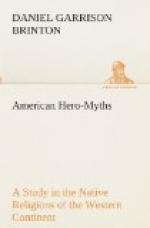Sec.2. The Culture Hero, Kukulcan.
The second important hero-myth of the Mayas was that about Kukulcan. This is in no way connected with that of Itzamna, and is probably later in date, and less national in character. The first reference to it we also owe to Father Francisco Hernandez, whom I have already quoted, and who reported it to Bishop Las Casas in 1545. His words clearly indicate that we have here to do with a myth relating to the formation of the calendar, an opinion which can likewise be supported from other sources.
The natives affirmed, says Las Casas, that in ancient times there came to that land twenty men, the chief of whom was called “Cocolcan,” and him they spoke of as the god of fevers or agues, two of the others as gods of fishing, another two as the gods of farms and fields, another was the thunder god, etc. They wore flowing robes and sandals on their feet, they had long beards, and their heads were bare. They ordered that the people should confess and fast, and some of the natives fasted on Fridays, because on that day the god Bacab died; and the name of that day in their language is himix, which they especially honor and hold in reverence as the day of the death of Bacab.[1]
[Footnote 1: Las Casas, Historia Apologetica de las Indias Occidentales, cap. cxxii.]
In the manuscript of Hernandez, which Las Casas had before him when he was writing his Apologetical History, the names of all the twenty were given; but unfortunately for antiquarian research, the good bishop excuses himself from quoting them, on account of their barbarous appearance. I have little doubt, however, that had he done so, we should find them to be the names of the twenty days of the native calendar month. These are the visitors who come, one every morning, with flowing robes, full beard and hair, and bring with them our good or bad luck—whatever the day brings forth. Hernandez made the same mistake as did Father Francisco de Bobadilla, when he inquired of the Nicaraguans the names of their gods, and they gave him those of the twenty days of the month.[1] Each day was, indeed, personified by these nations, and supposed to be at once a deity and a date, favorable or unfavorable to fishing or hunting, planting or fighting, as the case might be.
[Footnote 1: Oviedo, Historia General de las Indias, Lib. xlii, cap. iii.]
Kukulcan seems, therefore, to have stood in the same relation in Yucatan to the other divinities of the days as did Votan in Chiapa and Quetzalcoatl Ce Acatl in Cholula.
His name has usually been supposed to be a compound, meaning “a serpent adorned with feathers,” but there are no words in the Maya language to justify such a rendering. There is some variation in its orthography, and its original pronunciation may possibly be lost; but if we adopt as correct the spelling which I have given above, of which, however, I have some doubts, then it means, “The God of the Mighty Speech."[1]




